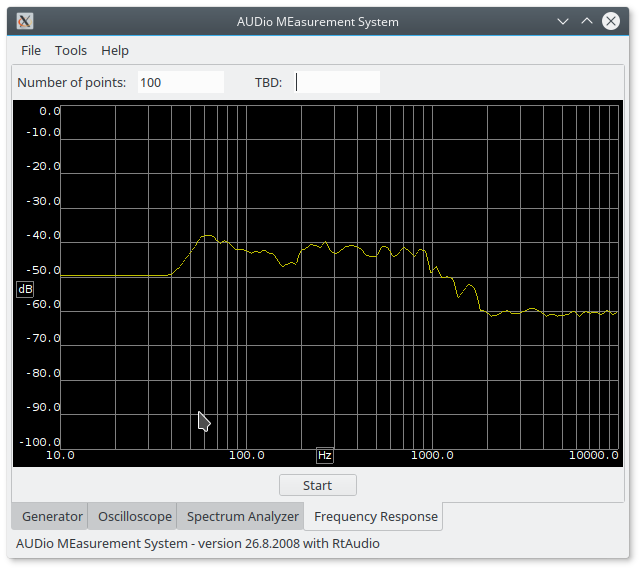
My current home stereo is a patchwork of various pieces I got on flee markeds over the years. It is amazing what kind of equipment show up there. I've been wondering for a while if it was possible to measure how well this equipment is working together, and decided to see how far I could get using free software. After trawling the web I came across an article from DIY Audio and Video on Speaker Testing and Analysis describing how to test speakers, and it listing several software options, among them AUDio MEasurement System (AUDMES). It is the only free software system I could find focusing on measuring speakers and audio frequency response. In the process I also found an interesting article from NOVO on Understanding Speaker Specifications and Frequency Response and an article from ecoustics on Understanding Speaker Frequency Response, with a lot of information on what to look for and how to interpret the graphs. Armed with this knowledge, I set out to measure the state of my speakers.
The first hurdle was that AUDMES hadn't seen a commit for 10 years and did not build with current compilers and libraries. I got in touch with its author, who no longer was spending time on the program but gave me write access to the subversion repository on Sourceforge. The end result is that now the code build on Linux and is capable of saving and loading the collected frequency response data in CSV format. The application is quite nice and flexible, and I was able to select the input and output audio interfaces independently. This made it possible to use a USB mixer as the input source, while sending output via my laptop headphone connection. I lacked the hardware and cabling to figure out a different way to get independent cabling to speakers and microphone.
Using this setup I could see how a large range of high frequencies apparently were not making it out of my speakers. The picture show the frequency response measurement of one of the speakers. Note the frequency lines seem to be slightly misaligned, compared to the CSV output from the program. I can not hear several of these are high frequencies, according to measurement from Free Hearing Test Software, an freeware system to measure your hearing (still looking for a free software alternative), so I do not know if they are coming out out the speakers. I thus do not quite know how to figure out if the missing frequencies is a problem with the microphone, the amplifier or the speakers, but I managed to rule out the audio card in my PC by measuring my Bose noise canceling headset using its own microphone. This setup was able to see the high frequency tones, so the problem with my stereo had to be in the amplifier or speakers.
Anyway, to try to role out one factor I ended up picking up a new set of speakers at a flee marked, and these work a lot better than the old speakers, so I guess the microphone and amplifier is OK. If you need to measure your own speakers, check out AUDMES. If more people get involved, perhaps the project could become good enough to include in Debian? And if you know of some other free software to measure speakers and amplifier performance, please let me know. I am aware of the freeware option REW, but I want something that can be developed also when the vendor looses interest.
As usual, if you use Bitcoin and want to show your support of my activities, please send Bitcoin donations to my address 15oWEoG9dUPovwmUL9KWAnYRtNJEkP1u1b.